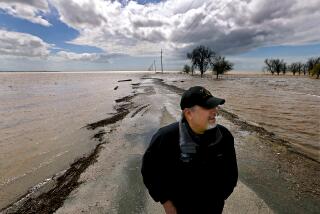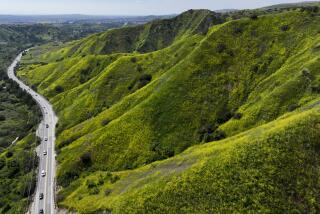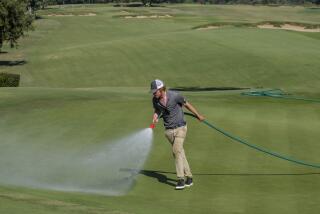In Riverside County, a water crisis
After the driest year on record, the governor Thursday declared a state of emergency in Riverside County after severe, prolonged drought conditions caused an estimated $4 million in crop damage and reduced public water supplies.
The unrelenting dry spell has heightened fire danger throughout Southern California’s tinder-dry foothills, triggered voluntary water conservation in some parts of the state and has been unforgiving to many farmers, especially in inland counties.
In Central California’s Kings County, the drought has caused an estimated $22 million in crop losses, mostly almonds, nectarines peaches and cotton. Gov. Arnold Schwarzenegger proclaimed an emergency in that county last month.
“The situation in Riverside County shows how precarious California’s water infrastructure is and underscores the need for a comprehensive plan for conveyance, storage and conservation,” Schwarzenegger said in a prepared statement.
Schwarzenegger directed the Office of Emergency Services to start drilling water wells or modify existing wells in the county.
Supervisor John F. Tavaglione said he didn’t envision the county calling for mandatory water restrictions, but said voluntary conservation efforts needed to be increased.
“Water is going to be a scarce commodity,” he said.
Riverside County’s wheat farmers have been hit especially hard by the current spell.
For the first time in almost a century, the Menifee farm owned by Mike Bouris’ family did not plant a wheat crop this year. Last month, the family decided to stop farming for good.
Bouris said the effect of the drought hit home last month when he auctioned off his farm equipment.
Neighboring farmers, facing losses themselves, could not afford to bid, even at deeply discounted prices. Instead, the equipment was brought by farmers in Iowa and Michigan and hauled halfway across the country.
“I had to sell things for less than 50 cents on the dollar, and that rang home more than anything,” said Bouris, whose family farm had planted wheat the previous 85 years.
The governor’s declaration came two days after the Board of Supervisors declared a local emergency, stating that reduced water availability had caused an estimated $4 million in crop damage. Earlier this year, a severe freeze hampered farming in the winter months.
Most Riverside County areas received less than 4 inches of rain in the last season, well off the average of 12 to 14 inches. Rain seasons are measured from July 1 to June 30.
“I’ve never seen it this bad, to this extent, as far as a drought situation,” said Steve Pastor, executive director of the Riverside County Farm Bureau. “A lot of farmers didn’t even take the chance of planting.”
The drought has adversely affected the county’s wheat and grain crop and caused some ranchers to remove their cattle and sheep from the area.
“The extreme weather has affected all the crops in Riverside County,” said county Agriculture Commissioner John Snyder. “This particular local declaration ... addresses the plight of the dry-land grain farmers. They live and die by the weather.”
Kings County Agriculture Commissioner Tim Niswander said rainfall in his area had been less than half the annual average and led to the million-dollar crop losses.
Some farmers chose to plow under cotton crops, he said.
“It didn’t look like they were going to get a sufficient return,” Niswander said.
There is hope that the disaster declaration will trigger federal assistance for farmers. The U.S. Department of Agriculture must officially recognize the dire conditions before farmers can receive aid.
“Essentially this provides funding for the county for any cost in dealing with this drought, and more importantly, the governor is pursuing loan assistance to help the farmers impacted as a result of this,” said Eric Lamoureax, spokesman for the Office of Emergency Services.
But for farmers like Bouris, news of the proclamation came too late. In 2002, the farm did not have a harvest. This year, even planting a crop would have been futile, he said. Instead, he had to lay off longtime workers and auctioned off the trailer he had bought a year ago.
“Maybe the Wheaties will start coming from Australia or China,” he said. “When you have less rainfall than you do in Death Valley, it doesn’t bode well for this industry.”
More to Read
Sign up for Essential California
The most important California stories and recommendations in your inbox every morning.
You may occasionally receive promotional content from the Los Angeles Times.










